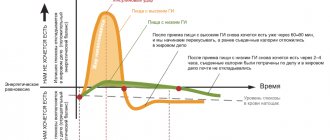Instructions for use
| Armacological action | A diabetes medicine that lowers fasting and postprandial blood sugar and glycated hemoglobin HbA1C. Partially blocks the production of glucose in the liver, as well as the absorption of eaten carbohydrates in the intestines. Increases tissue sensitivity to insulin. At the same time, it does not lower blood sugar excessively and does not cause hypoglycemia, unless the recommended dosage is exceeded. Helps people who are overweight lose weight. |
| Pharmacokinetics | The active substance metformin is excreted from the body by the kidneys and urine. It is not metabolized by the liver, although it affects its function (see below). Does not accumulate in the body, except in people who have severe renal failure. Glucophage Long tablets are absorbed more slowly, but they last longer than the regular Glucophage drug. |
| Indications for use | For patients with type 2 diabetes - in addition to diet and physical activity. Read more about the step-by-step treatment plan for type 2 diabetes. The drugs Glucophage and Glucophage Long, as directed by your doctor, can be combined with other diabetes medications and insulin injections. Many people take them for weight loss, to treat polycystic ovary syndrome in women, and as a cure for old age. |
| Contraindications | Patients who have had diabetic ketoacidosis, coma due to very high blood sugar. Impaired kidney function, glomerular filtration rate (GFR) below 45 ml/min. Liver failure. Fatty hepatosis (fatty liver) is not a contraindication. Acute infectious diseases. Dehydration. Severe heart failure. Alcoholism. Upcoming surgery or x-ray examinations with the introduction of iodinated contrast agent. |
| special instructions | If contraindications are ignored, lactic acidosis may occur. This is a deadly complication in which acid accumulates in the blood, its pH drops to 7.25 or lower. Symptoms: weakness, nausea, vomiting, shortness of breath, abdominal pain, coma. If there are no contraindications to taking Glucophage and you do not exceed the maximum daily dose, then the risk of lactic acidosis is almost zero. |
| Dosage | The maximum daily dose of Glucophage is 2550 mg (three tablets of 850 mg), Glucophage Long is 2000 mg. Reception begins with a minimum dose of 1 tablet of 500 or 850 mg per day. Then it is increased once a week if the patient tolerates the treatment well. Glucophage Long is recommended to be taken once a day at night. Regular Glucophage tablets - 1-3 times a day, with food. |
| Side effects | Possible diarrhea, nausea, loss of appetite. These are common but not dangerous side effects. They go away on their own after the body gets used to the medicine. To alleviate them, start with 500 mg per day with meals and do not rush to increase the dosage. Skin itching and rash are also possible. With long-term treatment, vitamin B12 deficiency may develop in the body. |
Composition and release form
Glucophage is a round, biconvex, white, film-coated tablet intended for oral administration. The medication is packaged in blisters of 10 or 20 pcs. 1 cardboard package contains 30 or 60 tablets, instructions for use. The manufacturer provides 3 dosages of Glucophage containing the active substance - 500, 850 and 1,000 mg in 1 tablet. Features of the chemical composition:
| Active ingredient, mg | Excipients, mg | Shell composition |
| metformin hydrochloride (500, 850, 1,000) | povidone (20/34/40) | macrogol 400 |
| Magnesium stearate (5/8, 5/10) | hypromellose | |
| macrogol 8,000 |
For weight loss

Glucophage can truly be called the dream of all those losing weight. It consists of the active substance metformin, which prevents eaten carbohydrates from being absorbed from the intestines into the blood. As a result, carbohydrates leave the body in stools that are looser than usual, more frequent, and with an abundance of gas. If you overindulge in sweets, you may experience stomach pain.
How to take Glucophage
The drug is intended for oral use in a full course. Tablets should be taken during or after meals, washed down with plenty of liquid. Daily doses and concentration of active substance 1 table. depends on the patient’s blood glucose level. The instructions contain the following recommendations for use:
- The initial dose of Glucophage is 500–850 mg in 2–3 daily doses. As blood glucose levels are examined and monitored, they are increased.
- The average daily dose of a hypoglycemic agent is 1,500–2,000 mg, which must be divided into 3 daily doses.
- The maximum dose of tablets is 3,000 mg, divided by the patient into 3 daily doses.
Before starting drug therapy, you should consult individually with your doctor. Thereby minimizing the risk of side effects. Valuable recommendations from the instructions:
- To avoid side effects, the concentration of metformin in the blood is increased gradually.
- In combination with insulin, the initial dose of Glucophage is 500–850 mg three times a day. Subsequently, glucose correction is carried out by changing the insulin dosage.
- Patients over 10 years of age are prescribed 500–850 mg once a day as part of mono- or complex therapy. It is gradually increased to 2,000 mg, but no more.
- The dosage of Glucophage for elderly patients is adjusted depending on the characteristics of the kidneys and the presence of chronic urinary system problems.
Article on the topic: Eleutherococcus - beneficial properties, methods of use, contraindications
Drug interactions
Glucophage is prescribed independently or as part of a full course of drug therapy. Instructions for use contain information about drug interactions:
- When used simultaneously with other glucose-lowering drugs or insulin, the risk of hypoglycemia increases.
- In combination with iodine-containing radiocontrast agents and diuretics, the risk of complications of diabetes and lactic acidosis increases.
- In combination with Danazol, hyperglycemia develops; adjustment of the daily dosage is necessary when interacting with antipsychotics.
- The drugs Amiloride, Morphine, Quinidine, Ranitidine increase the concentration of metformin.
- Glucocorticosteroids provoke ketosis, reduce glucose tolerance, and increase its concentration in the bloodstream.
- β2-adrenergic receptor stimulants and Chlorpromazine in combination with metformin increase the concentration of glucose in the bloodstream.
- Injections of beta-agonists increase blood sugar concentrations, while ACE inhibitors and antihypertensive drugs, on the contrary, reduce them.
- Sulfonylurea derivatives, Acarbose, and salicylates, when used simultaneously with metformin, cause the development of hypoglycemia.
Glucophage during pregnancy
According to the instructions for use, when planning pregnancy and bearing a fetus, treatment with Glucophage should be stopped . The doctor prescribes insulin and adjusts daily dosages individually. Taking pills during lactation is also contraindicated, since metformin is excreted in breast milk. According to the instructions, when this medication is prescribed, breastfeeding is stopped and the child is temporarily transferred to adapted formulas.

Glucophage price
The cost of the medicine is 100–350 rubles. The price depends on the concentration of the active substance of 1 tablet and the number of pieces in the package. For example, the cost of the drug is 500 mg, 30 tablets. is 100–150 rubles, and 850 mg, 60 tablets. – 200–250 rubles.
| Name of capital's pharmacies | Price 850 mg 30 pcs., rubles |
| ZdravZone | 115 |
| Evalar | 115 |
| Pharmacy "36.6" | 118 |
| South | 120 |
| ElixirPharm | 120 |
| EuroPharm | 130 |
| Neopharm | 130 |
Contraindications
The instructions for use contain a comprehensive list of medical contraindications when oral administration of a hypoglycemic agent can harm the patient's health. This:
- acute renal failure;
- diabetic ketoacidosis, coma;
- liver failure;
- severe dehydration;
- recurrent diseases of the body of an infectious and non-infectious nature;
- poisoning of the body, shock;
- injuries and surgical interventions;
- chronic alcoholism, poisoning with ethanol breakdown products;
- respiratory and heart failure, acute myocardial infarction;
- pregnancy at any obstetric stage;
- lactation period;
- hypocaloric diet;
- carrying out radioisotope diagnostic techniques and x-rays;
- increased sensitivity of the body to metformin.

special instructions
Before starting a course of treatment with Glucophage, you must carefully study the instructions for use and consult your doctor. Valuable recommendations:
- If surgery is necessary, stop using the tablets a couple of days before surgery.
- In patients with renal or liver failure or chronic alcoholism, the metformin component accumulates in the blood. This is how lactic acidosis progresses and the risk of death increases.
- When treating with Glucophage, it is necessary to monitor kidney function, and in case of glycemia, systematically measure blood glucose levels.
- When treating with this drug, a uniform supply of carbohydrates to the body is necessary. The calorie content of the daily menu is not less than 1,000 calories.
- The drug does not affect the speed of psychomotor reactions, therefore, during treatment it is allowed to drive a vehicle and engage in intellectual activities.
- Long-term use of a hypoglycemic agent contributes to the occurrence of hypovitaminosis B12, so a break is required between courses.
Overdose
When daily doses of Glucophage are systematically exceeded, lactic acidosis (lactic acidosis) develops . The patient's breathing quickens, pronounced signs of dyspepsia appear, dizziness worries, body temperature rises, confusion and coma are observed. First of all, in the hospital you need to find out the lactate concentration, and then carry out hemodialysis. Further treatment is symptomatic.
Article on the topic: Primary hyperaldosteronism: symptoms and treatment
PROS AND CONS OF TAKING GLUCOPHAGE
The undoubted advantages include the following:
- activation of the process of burning and oxidizing fat deposits;
- minimizing the volume of carbohydrates absorbed by the walls of the gastrointestinal tract;
- stimulating the process of glucose processing in muscle tissue;
- slow but steady loss of body weight.
However, like any other drug, glucophage has a fairly impressive list of contraindications, which include:
- serious kidney pathologies, developing renal failure;
- acute diseases of blood vessels and heart muscle;
- liver dysfunction;
- bronchopulmonary pathologies;
- diseases of infectious origin;
- postoperative period;
- anemia;
- addiction to alcohol;
- failure of the body to accept certain ingredients of the drug.

Taking the drug glucophage has side effects, if they occur, you should immediately seek help from a doctor. Taking this drug may cause a complete loss of food cravings, a metallic taste in the mouth, vomiting, nausea, diarrhea, allergic rashes and severe abdominal pain.
But the most terrible side effect of taking glucophage is the possibility of developing lactic acidosis - a pathology that represents a sharp increase in the concentration of lactic acid in the body and a disturbance in its metabolism, up to hyperlactic acidemic coma. Therefore, you need to be extremely careful when using the drug glucophage for weight loss.










